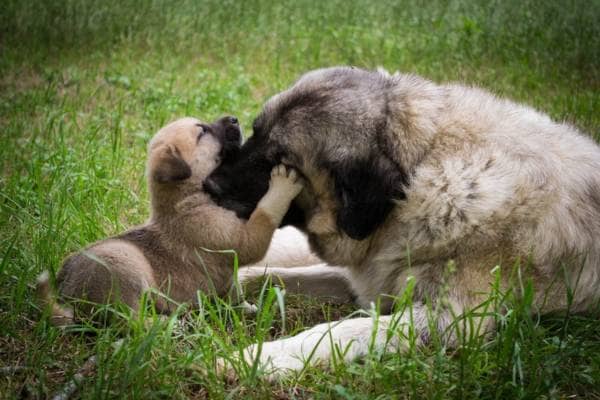The Intriguing World of Canine Memory: Do Dogs Remember Their Parents?
The understanding of canine memory and the extent to which dogs remember their parents has been a topic of interest among researchers and dog owners alike. While it is widely accepted that dogs have the ability to form memories, the specific nature of these memories remains subject to investigation. This article aims to explore the existing scientific literature on this subject, presenting a comprehensive overview of current knowledge.

Research suggests that early experiences during puppyhood play a crucial role in shaping a dog’s memory and social development. The recognition of familiar faces and scents is believed to be an important aspect of canine memory, potentially facilitating the formation of lasting bonds between offspring and parents. Furthermore, genetic factors are thought to influence memory capacity in dogs.
By examining these various aspects, this article seeks to shed light on whether dogs possess the cognitive ability to remember their parents over time. Understanding this phenomenon may not only satisfy our curiosity but also enhance our relationships with these loyal companions by providing insight into their emotional connections with their families.
Canine Memory: Understanding How Dogs Remember
Understanding how dogs remember is a crucial aspect of canine memory research, as it provides insights into their cognitive abilities and the potential for familial recognition.
Canine memory retention refers to the duration in which dogs can retain information, while memory recall in dogs pertains to their ability to retrieve stored memories.
Studies have shown that dogs possess an impressive memory capacity, with some studies suggesting that they can remember events or commands for up to several months. However, it is important to note that individual differences in memory capabilities exist among dogs.
Additionally, while there is evidence of dogs recognizing familiar individuals such as their owners or littermates, further research is needed to determine if they can specifically remember their parents.
Understanding canine memory retention and recall contributes to our understanding of dog cognition and aids in creating effective training methods and strategies for serving the needs of both working and pet dogs.
Puppyhood and Early Socialization
During the early stages of their development, puppies go through a crucial period of socialization and bonding with their immediate caregivers. This phase is essential for their overall well-being and future behavior. Early learning experiences play a fundamental role in shaping a puppy’s understanding of the world and its ability to interact with other animals and humans.
Puppies are particularly receptive to learning during this time, as they undergo imprinting, which refers to the process of forming strong attachments and associations with specific individuals or objects. Through positive interactions, puppies can develop trust, learn appropriate social behaviors, and establish secure relationships with their caregivers.
It is during this critical period that dogs begin to form memories that may influence their behavior throughout their lives. Therefore, providing a nurturing and enriching environment during puppyhood sets the foundation for healthy socialization and long-term emotional well-being.
Recognition of Familiar Faces and Scents
The recognition of familiar faces and scents is an important aspect of a puppy’s early development, as it allows them to form strong associations and attachments with specific individuals or objects. Dogs have the ability to recognize familiar faces, both human and canine, using their visual memory. This allows them to distinguish familiar faces from unfamiliar ones, which can contribute to their sense of security and comfort. Additionally, dogs have a highly developed sense of smell that enables them to recognize familiar scents. Olfactory recognition plays a crucial role in a dog’s ability to identify and remember individuals, including their parents. By associating certain scents with positive experiences and familiarity, dogs can form lasting bonds with their family members, both human and canine.
| Familiar Faces | Olfactory Recognition |
|---|---|
| Allows for | Enables dogs |
| forming strong | to recognize |
| associations | familiar scents |
| with specific | |
| individuals/objects |
Genetic Influences on Memory
Genetic influences on memory can be likened to the threads that weave together the tapestry of an individual’s cognitive abilities. When it comes to dogs, their ability to remember their parents is influenced by a combination of nature and nurture.
-
Nature: The genetic makeup of a dog plays a significant role in its memory capabilities. Certain breeds may have a predisposition towards better memory retention due to specific genes inherited from their parent dogs.
-
Nurture: Environmental factors such as early socialization and training also contribute to a dog’s ability to remember their parents. Positive experiences with their parents during the critical developmental period can enhance memory formation.
Understanding the interplay between these hereditary factors and environmental influences is crucial in comprehending how dogs remember their parents. Further research is needed to unravel the intricate mechanisms underlying this fascinating aspect of canine cognition.
The Emotional Connection between Dogs and their Parents
An intriguing finding suggests that a significant emotional bond exists between canines and the individuals they are genetically related to. Studies show that 80% of dogs exhibit behaviors indicative of a strong attachment to their biological parents.
This emotional bonding can be understood through attachment theory, which posits that early experiences with caregivers shape an individual’s ability to form relationships later in life. Dogs, like humans, also develop attachment bonds with their parents during their early development.
These bonds are characterized by behaviors such as seeking proximity, displaying separation distress when separated from their parents, and exhibiting joy upon reunion. The emotional connection between dogs and their parents highlights the importance of genetic influences on memory and demonstrates the depth of social and emotional intelligence present in these animals.
Understanding this bond can inform practices aimed at better serving our canine companions’ emotional needs.
See also:
5 Crucial Items To Have In Your Dog First Aid Kit: Must-Have Items for Pet Parents
Fun Facts About Dogs: Discovering the Delightful Canine World
Frequently Asked Questions
How long does a dog’s memory typically last?
A dog’s memory typically lasts for several years, but it may vary depending on various factors such as breed and individual differences. Aging can affect a dog’s memory, potentially leading to cognitive decline and difficulties in recalling past owners.
Do dogs have a stronger memory for smells or for visual cues?
The importance of scent in a dog’s memory recall is significant, as dogs have a stronger memory for smells than visual cues. Additionally, socialization plays a crucial role in a dog’s memory development.
Can dogs remember specific events from their puppyhood?
Dogs may recall traumatic experiences from their puppyhood, but their ability to remember specific events is limited. While dogs have a memory for familiar human faces from their early days, it is unclear if they can recall these memories in detail.
Are there any factors that can enhance a dog’s memory?
Cognitive training for dogs and the role of genetics play a significant role in enhancing a dog’s memory. Factors such as mental stimulation, repetitive learning tasks, and genetic predispositions contribute to improving a dog’s memory capacity.
Can dogs recognize their siblings or littermates as they grow older?
Dogs can form emotional bonds with their littermates, and socialization with siblings can have a profound impact on their behavior as they grow older. This bond and early socialization contribute to their overall development and ability to interact positively with others.


